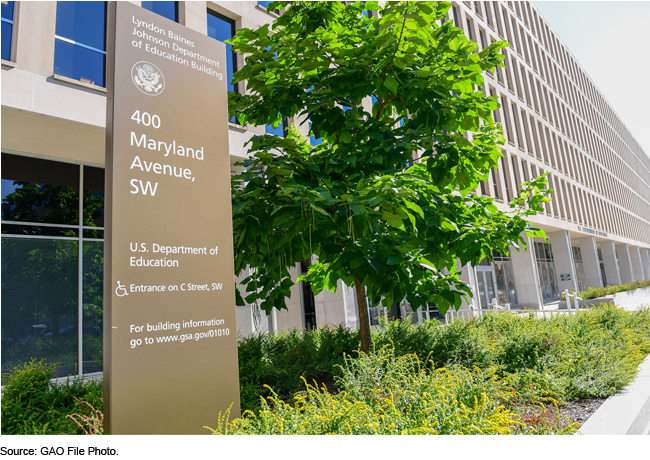Higher Education: Education Could Improve Information on Accommodations for Students with Disabilities
Fast Facts
The percentage of college students with disabilities has grown since 2004—largely due to more students reporting mental health conditions.
Some students with disabilities face challenges in college because they don't know they should request and self-advocate for reasonable accommodations.
The Department of Education has issued tips for students on this topic that may not reach them. And college staff said Education doesn't notify people when new guidance is available. Our recommendations address these issues.

Highlights
What GAO Found
The percentage of college students with disabilities has increased since 2004 according to GAO's analysis of Department of Education data (see figure). The increase is largely driven by more students reporting mental health conditions or attention deficit disorder. Students with disabilities graduated from college at lower rates than those without disabilities. Further, those with disabilities who did graduate were less likely to be employed full-time than peers without disabilities.
Estimated Percentage of College Students by Disability Status, 2004–2020

Note: “College students” includes undergraduates from postsecondary institutions of all types. Estimates are within a 1 percent margin of error.
Students with disabilities face several challenges while transitioning to and attending college, according to college disability services staff and students GAO spoke with. For example, some students are unaware of or unprepared for the self-advocacy necessary to request accommodations without help from their parents, who can play a pivotal role in obtaining academic supports in high school. In addition, some students experience reluctance from faculty to provide accommodations. To help mitigate these challenges, college staff reported holding orientation sessions for students on how to request accommodations and training faculty on how to make their courses accessible, among other steps.
Education has also taken steps to help address challenges faced by college students with disabilities. Education provides a range of supports including guidance, technical assistance, grants, and other resources. Education's priorities and federal standards highlight the need for prompt communication of guidance and other information affecting college students with disabilities. However, college staff GAO spoke with identified information gaps. For example:
- Education has issued guidance materials on the importance of self-advocacy for students with disabilities in college, but this information may not reach students transitioning from high school. By encouraging state and local educational agencies to disseminate resources about the need for self-advocacy to assist students who wish to attend college, Education could help ensure that college students with disabilities are prepared to obtain needed accommodations.
- Education does not provide notifications to college staff of newly issued guidance and other information about accommodations for students with disabilities, despite notifications on other topics. As a result, college staff report difficulties staying current on information that could help them support students with disabilities.
Why GAO Did This Study
Research suggests that more students with disabilities are pursuing college than in years past. GAO was asked to review issues regarding accessibility and accommodations for students with disabilities at colleges.
This report examines (1) trends in and characteristics of the population of college students with disabilities, (2) any challenges to accessing education that students with disabilities face in college and how colleges have mitigated them, and (3) the extent to which Education helps mitigate these challenges.
GAO analyzed the most recent data from three of Education's nationally representative surveys. GAO also held eight discussion groups with college students, faculty, and disability services staff and interviewed Education officials. Colleges were selected for institutional variety (e.g., public and private). GAO also reviewed recent academic reports, relevant federal laws, and pertinent guidance documents.
Recommendations
GAO is making two recommendations to Education to (1) encourage state and local educational agencies to disseminate resources about the importance of self-advocacy to obtain accommodations in college, and (2) enable college staff to receive notifications of newly issued guidance and other information about accommodations for postsecondary students with disabilities. Education generally agreed with GAO's recommendations.
Recommendations for Executive Action
| Agency Affected | Recommendation | Status |
|---|---|---|
| Department of Education | The Secretary of Education should encourage state and local educational agencies to disseminate resources to assist IEP teams in informing students with disabilities who are considering postsecondary education about the importance of self-advocacy in obtaining accommodations in college. (Recommendation 1) |
In December 2024, the Department of Education developed and disseminated blog posts and a resource guide to encourage state and local educational agencies to assist Individualized Education Program teams with informing students with disabilities about the importance of self-advocacy in postsecondary endeavors such as obtaining accommodations in college.
|
| Department of Education | The Secretary of Education should ensure that the Assistant Secretary for Civil Rights provides DSO staff a way to receive electronic notification of newly issued guidance and other information related to accommodations for students with disabilities in higher education, similar to its existing notifications on other education-related topics. (Recommendation 2) |
The Department of Education's Office for Civil Rights added three new categories of information to the Department of Education's subscription page for those who wish to stay informed of its programs, policies, and initiatives: Civil Rights All Updates; Civil Rights Higher Education Updates; Civil Rights PreK-12 Updates. College disability services office staff can now sign up for any of those categories of updates.
|
